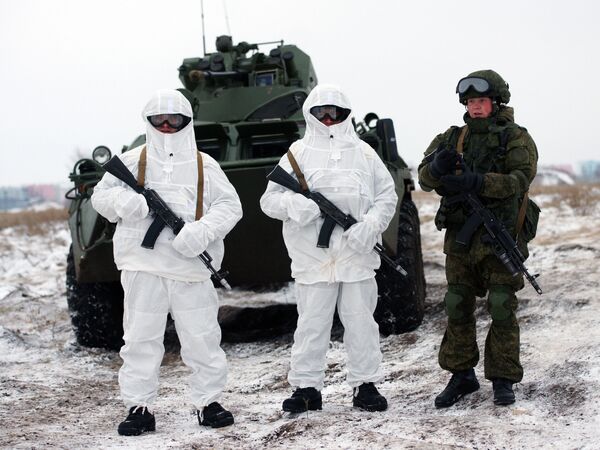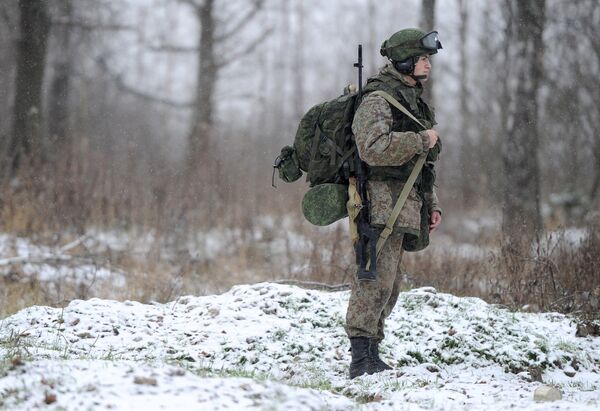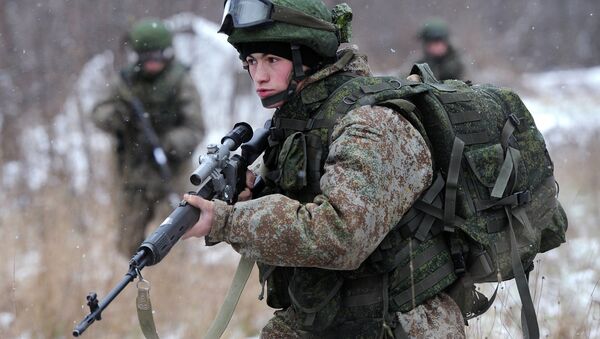It took the St. Petersburg-based company 18 years to develop the system, and given that a whole array of specialists were dealing with the job, it is safe to assume that a total of 150 man-years were spent on the implementation of the project, according to Lamin.
Giving kudos to prominent Russian scientist and Titan VP Oleg Maleyev for adding significantly to the development of the system, Lamin pointed out that the importance of the system's creation can hardly be overestimated.

"The system is needed to win important seconds on the battlefield and to save the lives of our soldiers," he said.
He recalled that nowadays, military computers can be likened to smartphones and that a person who uses a mobile phone to chat in the street risks being run over a car. "So imagine a soldier in this position who also has a sub-machine gun that needs two hands to hold," according to Lamin.
"The voice control system frees a soldier's hands and eyes during fighting, and he can simultaneously move, shoot, and interact with the computer. Also, he can communicate with the command, send messages and listen to the advice of an advanced automated system as well as receive ciphered voice messages," he said.
Asked about whether his company's voice control system can be compared to Apple's Siri (Speech Interpretation and Recognition Interface) service, Lamin said that it is Siri that can be called the Russian system's analogue.

In short, Siri is trying to translate voice into text, experiences errors 7-30 percent of the time, and then figure out what to do with the text. That is, the system always chooses from a vocabulary of several million words – and is equally bad all the time. Then the system accumulates statistics on a certain user and, applying its assumptions on what the man said, selects the most probable variants, according to Lamin.
"A person never acts in such a way, which is also the case with our system. Our technology uses the context, the environment, and the previous dialogue to predict which general phrases can make sense at the moment. This is also a huge number, but significantly less than a few million," he said.
Lamin recalled that his company was the first to receive the 2001 Best Software Award for its Speereo Voice Organizer for Pocket PC, and that more than three million people installed the system at the time, when he said there were no iPhones.
Ratnik New future soldier russian soldier individual gear equipement sys… https://t.co/eTNhKI1EOb @YouTubeさんから
— 大芝鉄蔵 (@Diesirae41) 26 декабря 2015 г.
通訳の人ポケットに手入れんなw
"Thanks to the most advanced mathematics developed by our vice president, Oleg Maleyev, the Speereo system shows the accuracy of management tasks at a level of 99.9 percent and works on any device which has 5 MB of memory and 200 MIPS, which is not the case with Siri," he said.
Additionally, the Russian voice control system is noise resistant and capable of working in a very noisy environment, where a man is powerless to do anything, according to Lamin.
The Ratnik outfit is mainly designed for snipers, riflemen, drivers of armored vehicles and airborne combat vehicle gunners.
Earlier this year, Russia's Land Forces commander Col. Gen. Oleg Salyukov said that the development of the third generation Ratnik infantry combat system is already under way in Russia, and that more than 80,000 Russian servicemen were equipped with Ratnik-2 "soldier of the future" gear in 2015.




